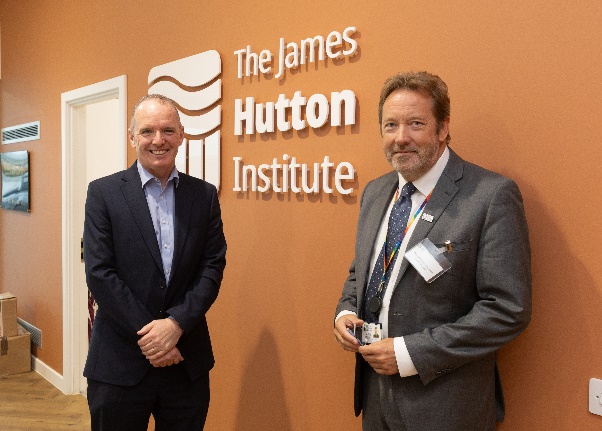James Hutton Institute receives £3m investment from Scottish Enterprise

Adrian Gillespie and Colin Campbell
The James Hutton Institute has received a £3 million investment from Scottish Enterprise for its new high throughput phenotyping facility, part of the advanced plant growth centre (APGC), housed in its crop innovation centre (CIC).
The facility allows researchers to assess plants architecture and health using sensors and lasers to map the plant in detail and how this is then influenced by genetic make-up and changes in the environment. Together with automation and AI the facility will accelerate crop innovation. By discovering new traits more quickly it will provide a faster route to market for plant breeders serving the agriculture, horticulture, pharmaceutical and food and drink sectors.
The new investment comes in addition to the £62m invested through the Tay Cities Region Deal (TCRD) by the UK and Scottish Governments, which funded two new innovations centres, the APGC and the International Barley Hub (IBH), both created in partnership with the University of Dundee Plant Sciences Division.
The cutting-edge plant phenotyping platform is designed to create controlled climate conditions that crops will experience in the future. It integrates automated plant handling, irrigation and climate control together with advanced imaging technologies to screen large populations of plants and select those best suited to the future climate conditions.
It will enable researchers to replicate current, and predicted, global crop production conditions, thus accelerating the breeding and growing of climate resilient and low input crops, enhancing the APGC’s research on the issues facing global food, non-food and pharmaceutical crops.
The facility is part of a suite, combining advanced phenotyping, automation, AI-driven analytics and a high-performance computing cluster that supports pioneering research and industry collaboration. As an open platform it will enable national and international collaboration to attract projects that cross academia and industry and ensure a whole sector approach to a more sustainable future for agriculture.
Speaking of this funding, the Hutton’s chief executive, Professor Colin Campbell said: “This is a very welcome investment from Scottish Enterprise as this equipment is facilitating some of the most pioneering research into crop resilience being carried out anywhere in the world.
“In a recent economic impact report from BiGGAR into the Hutton, it was noted that for every £1 of funding received, we deliver £15 in economic value for the UK economy, of which £9 is retained in Scotland.
“It’s thanks to this type of investment that we continue to make the impact we do, using science to secure a more sustainable future, keeping food costs down, protecting livelihoods and making a positive contribution to our economy”.
Scottish Enterprise chief executive Adrian Gillespie said: “The new phenotyping equipment, supported by Scottish Enterprise, builds on existing facilities at The James Hutton Institute including the International Barley Hub and the Advanced Plant Growth Centre.
“The cutting-edge facilities in Invergowrie combine innovative technology for the industrial biotechnology and agricultural sectors and will help create hundreds of new jobs, boost productivity and support scale-ups to benefit the Scottish economy.
“Our support will enable more businesses to use the facilities to translate world class research into commercial ventures with the potential to scale.”
Dr Rob Hancock, deputy director of the advanced plant growth centre, said: “This new facility accelerates the identification of key traits for crop resilience, yield improvement and stress tolerance, climate change adaptation, sustainable agriculture and precision farming. By leveraging Hutton expertise in genetics, we will enhance industry collaboration to bring the new varieties needed to support agriculture more quickly. Moreover, the facility directly supports new developments in controlled environment agriculture (CEA) and vertical farming.”







